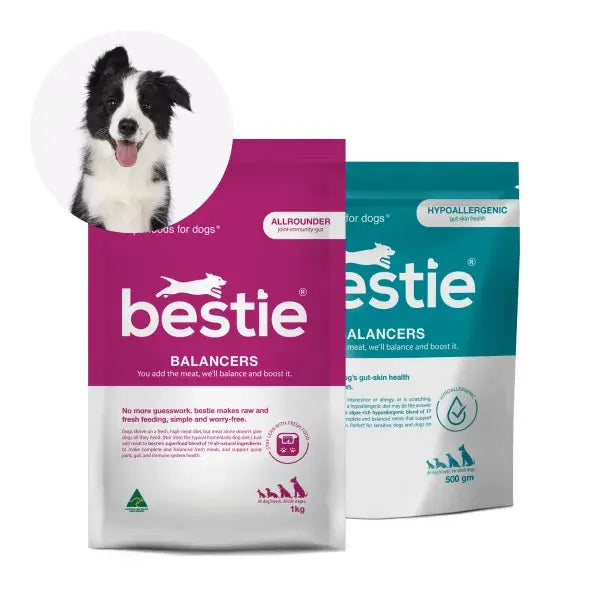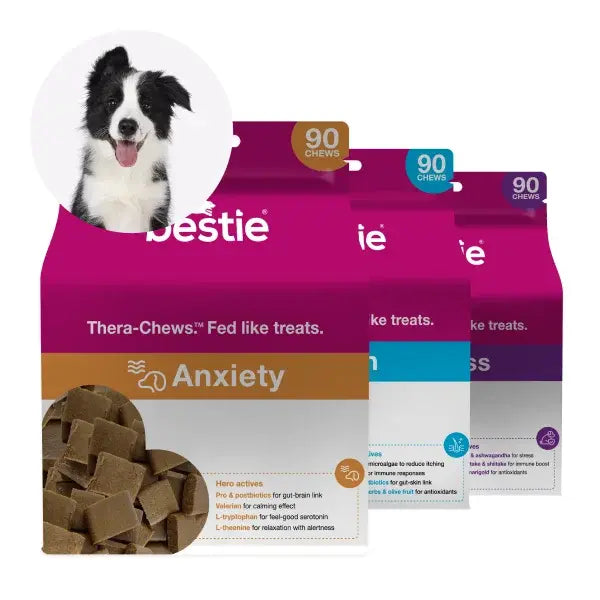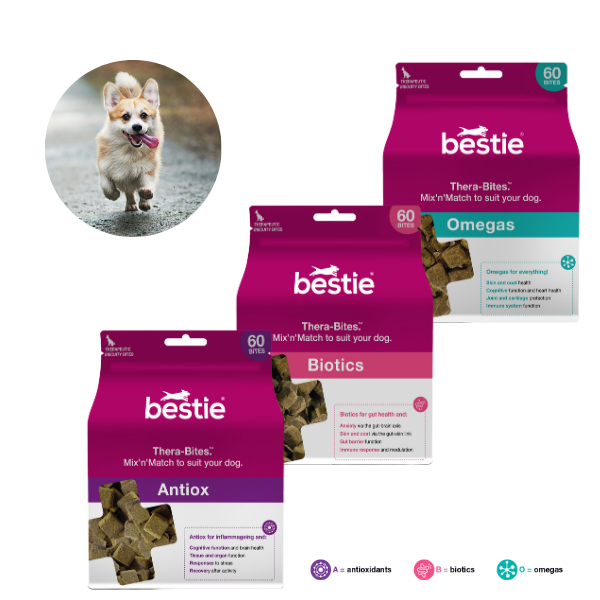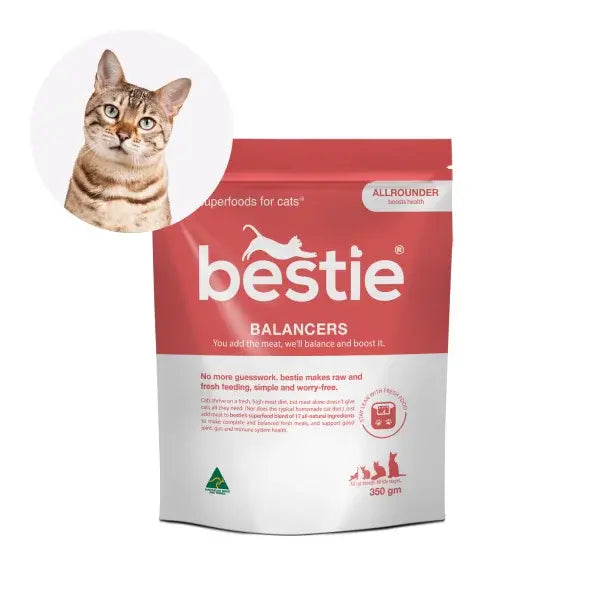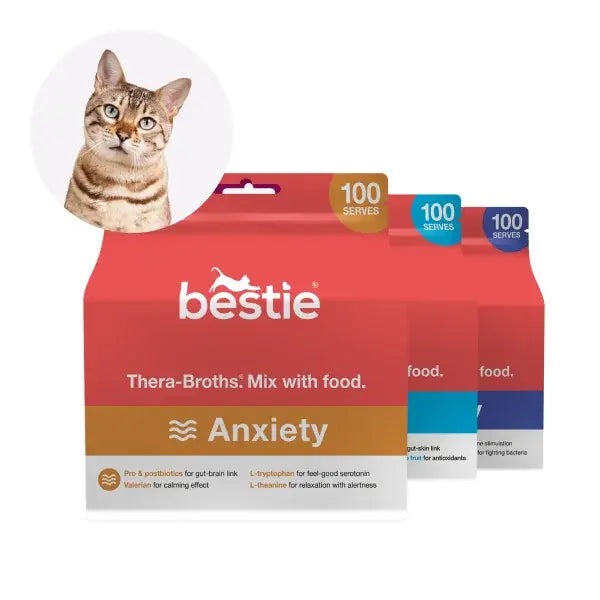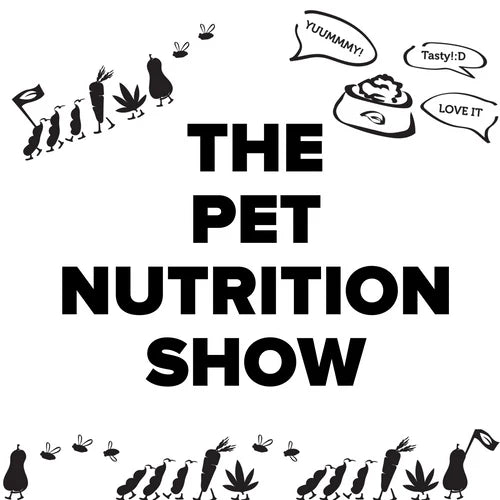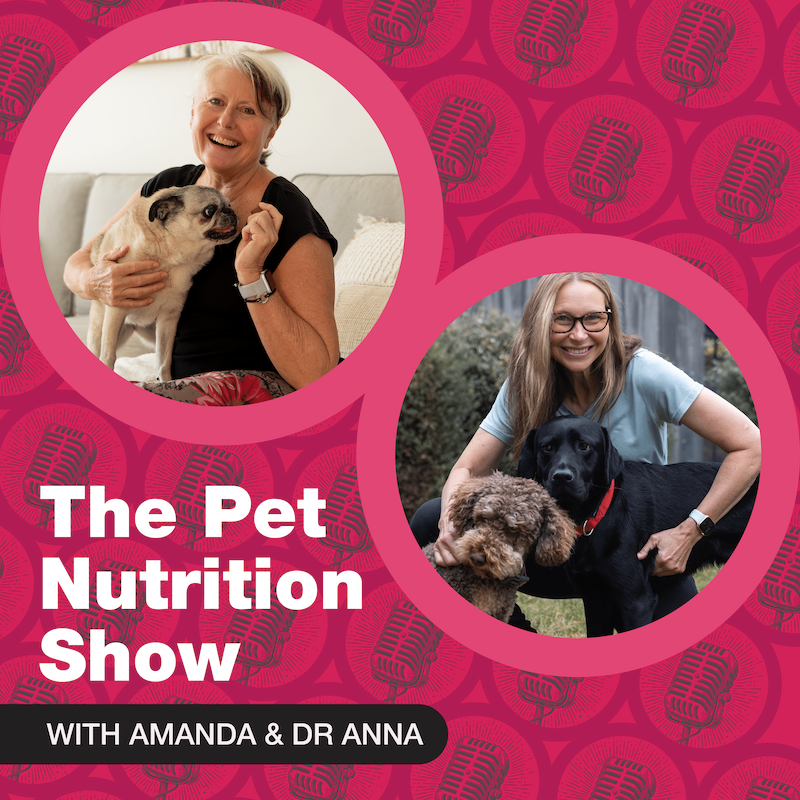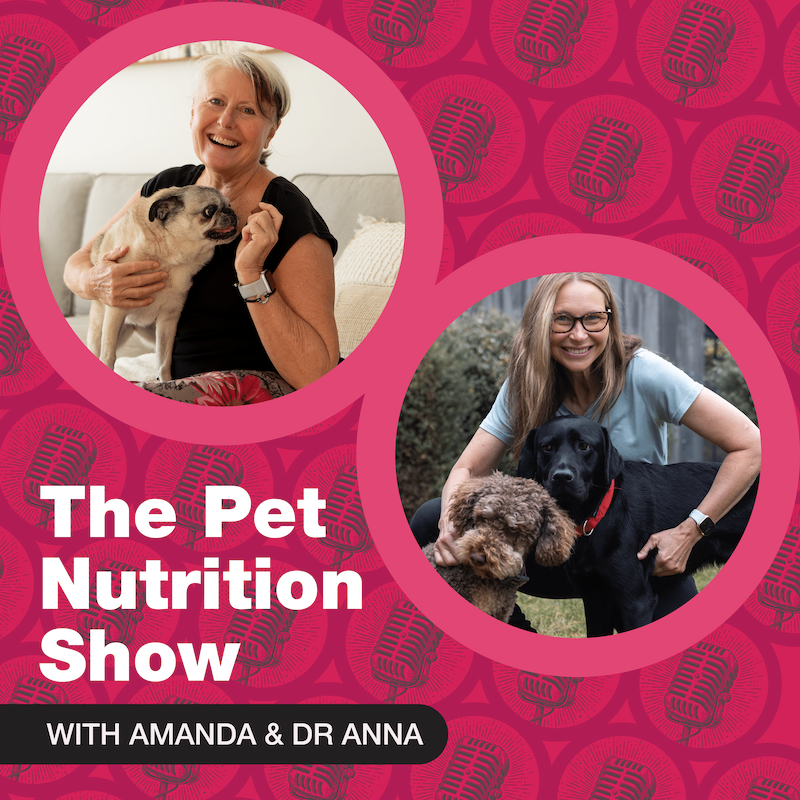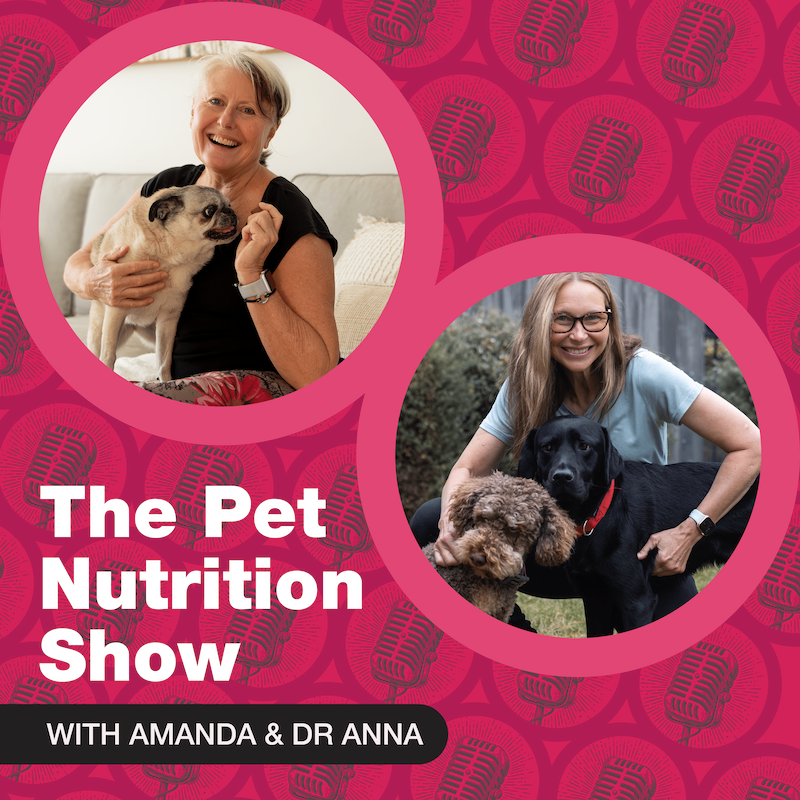Turning your dog or cat vegan could help them live longer and save you money at the vet.
In the second episode of The Pet Nutrition Show, we talk to Dr Andrew Knight, a veterinarian turned veterinary academic, who puts the cat right among the pigeons by advocating vegan diets for pets. In our interview, we explore the environmental and health benefits associated with feeding pets a vegan diet.
Here are the headlines from The Pet Nutrition Show interview:
- A study of 2500 dogs showed that dogs on a vegan diet went to the vet less, and needed less medication. They have health outcomes that are at least as good and sometimes better than dogs fed conventional meat-based diets.
- A study produced by a research group at one of Canada's leading veterinary schools found that dogs fed vegan diets had an average lifespan one and a half years longer than those on conventional meat-based diets.
- A palatability study of 2300 dogs and 1100 cats, found that animals seemed to be enjoying the vegan diets as much as the meat-based diets on average.
- Obligate carnivore means that in their natural environments out in the wild, cats need to hunt and kill a variety of small mammals, birds, and insects in order to meet their nutritional needs. That's got very little relevance to a modern domesticated house cat.
- What the cats need biologically and the same for dogs and indeed for any species is a specific set of nutrients packaged up into a formulation that's sufficiently palatable so the animals will enjoy eating it and adequately digestible
- Just under half of all the ingredients used in conventional dog and cat food are actually plant-based. It’s the other meat ingredients that have the most environmental impact.
- If all the world's dogs transitioned to vegan diets, the greenhouse gas savings would be equivalent to the emissions of the entire United Kingdom. You would also be able to feed another 450 million people with the food energy saved, and that's more people than in the entire European Union.
Have a listen to the show, but if you’re more of a reader, here is the transcript:
[00:00:00] ANDREW: This is the Pet Nutrition Show with Amanda and Dr. Anna.
[00:00:06] ANNA: Welcome to the Pet Nutrition Show. I'm Dr. Anna Sutton and with my co host Amanda, we'll be talking nutrition, sustainable pet food, and food hacks you can do at home. Now today we're asking the question, can dogs and cats have a vegan diet and if they did, what would it do for the environment?
[00:00:24] ANDREW: I think one of the factors that might be most convincing is one of the most recent studies which was produced by a research group at one of Canada's leading veterinary schools and it found that dogs being fed Vegan diets were actually living quite a lot longer than dogs being fed meat based diets.
[00:00:41] So the average lifespan was one and a half years longer and for a person that's equivalent to around about an extra decade of lifespan at the end of one's life.
[00:00:52] ANNA: That was Andrew Knight, an Australian vet and veterinary academic based in the UK, and our interview with him on the [00:01:00] environmental and health impacts of switching to vegan diets for dogs and cats is coming up next.
[00:01:05] But first, it's
[00:01:06] ANDREW: Q& A. Pet Q& A, where we answer what you're wondering about food, moods, and
[00:01:14] AMANDA: poos. Now, Emma, people often talk about the digestibility of this and that, and I know we're looking at vegan diets today, but what would you say is the digestibility of plant based protein versus meat based
[00:01:28] ANNA: protein?
[00:01:29] Oh, geez, Amanda, it's actually a really big subject, and I know we're unpacking that more in future episodes. However, let me just give you a quick fun fact. Soybean meal actually has a slightly more complete amino acid profile for dogs than meat and bone meal of an equivalent percentage protein. And meat and bone meals actually are very commonly used, uh, pet food ingredients in dry pet food.
[00:01:55] AMANDA: But isn't that a kind of
[00:01:56] ANNA: Look, today, [00:02:00] meat and bone meal isn't considered the most premium of pet food ingredients. And the quality does vary considerably, but it still plays a role as an important source of protein and fat and minerals in many kibble diets. It's actually usually combined with other protein meals, such as poultry, for example.
[00:02:18] And you've got to remember, meat and bone meal is an animal byproduct. In that way, it's really pretty sustainable. It
[00:02:25] AMANDA: sure is. Our guest is a vet turned veterinary academic who, at the age of eight, told his mother he was turning vegetarian. He became vegan at 23 and has been an animal advocate ever since.
[00:02:38] Andrew Knight. Welcome. Thank you very much. Now you've practiced as a vet for over a decade, founded the University of Winchester's Centre for Animal Welfare in the UK, and you're currently Adjunct Veterinary Professor of Animal Welfare at Griffith University, and you've ditched full time academia recently.
[00:02:56] ANDREW: Why? Look, we're in the, I think the biggest crisis [00:03:00] of our generation and the ones that will follow in terms of climate change, biodiversity loss, the wholesale destruction of the other species with whom we share our planet. Since I was born in 1970, we've had more than 50 percent of animal populations on the planet have disappeared.
[00:03:15] So, I think we all need to be looking at what we can do to most effectively, uh, address this problem. For me, it wasn't remaining an academic, it was, um, diverting into more full time research and communication about, uh, the causes of these problems, climate change, biodiversity loss, and what we can do to address them.
[00:03:34] Currently I'm doing a lot of research, as you know, into vegan pet food, which seems to be offering some really important solutions. So I thought it was important for me to be able to focus more on that. And
[00:03:44] AMANDA: you did author a paper that was published last year that looked at the environmental sustainability of vegan diets for dogs, cats and people.
[00:03:52] But why did you choose to look at the impact of vegan diets and do it for pets and people?
[00:03:58] ANDREW: It's very clear [00:04:00] that, uh, the livestock sector is one of the top, uh, contributors to climate change, uh, land degradation and deforestation, freshwater consumption, and so on. And there've been many calls for changes in our diets, but there've been very few studies actually looking at, uh, what would the impact be if we changed the diets of our dogs and cats.
[00:04:19] Actually, dogs and cats consume a major proportion of livestock produce. So it seemed that they might actually be quite big contributors and potentially transitioning them onto nutritionally sound vegan diets might offer large environmental benefits, but nobody had really calculated what those might be.
[00:04:36] So I wanted to do that. So that's how I came to do the
[00:04:39] AMANDA: study. Well, let's take those key insights now and let's take emissions first. So what is the impact of switching to vegan diets for dogs, let's say, on greenhouse gas emissions?
[00:04:51] ANDREW: They're really large, so if the world's dogs would transition onto nutritionally sound vegan diets, you would spare more greenhouse gases than are produced by the entire United [00:05:00] Kingdom.
[00:05:00] So, so there are very large savings. In comparison, if you were to transition people onto nutritionally sound vegan diets, you would free up more greenhouse gases than are produced by the entire European Union. A much larger area, but the savings produced by dogs would still be very significant. You
[00:05:17] AMANDA: also looked at land and water use, which is another important aspect of environmental impact.
[00:05:22] What did, you know, if dogs and cats, for instance, switch to vegan diet, what's the impact on land
[00:05:28] ANDREW: and water? Again, there would be huge savings, uh, in land and water use, uh, because of the ending of deforestation to graze pasture fed animals and to grow feed crops to feed to livestock animals. And also the, the consumption of fresh water, uh, by the livestock sector is also enormous.
[00:05:45] So there'd be very large savings of, of land and water as well, if all of it. Well, as dogs transition onto nutritionally sound vegan diets, it's, um, free up land larger and greater than the size of Mexico, and you'd spare freshwater, uh, greater than all renewable [00:06:00] freshwater available in, in Denmark. In comparison, if all the people in the world transitioned onto nutritionally sound vegan diets, you'd actually free up more land than Russia, which is the world's largest country combined with India.
[00:06:12] So. Bye. Very large land volumes would be spared as well. And one of the even more exciting impacts, I think, is looking at the savings in food energy and the number of additional people you could feed with all of that food energy saved. I found some really exciting results there
[00:06:29] AMANDA: as well. Talk to that.
[00:06:30] That food availability is a problem and will become a worsening problem. So how does dietary change affect food
[00:06:38] ANDREW: availability? Yeah, this is a really big issue because there's very inequitable consumption of grain around the world. One in nine people on the planet currently suffer from hunger and malnutrition, although we actually produce, it's been estimated, double the amount of grain that we need to feed everybody on the planet.
[00:06:57] If you were to transition all the world's [00:07:00] dogs onto nutritionally sound vegan diets, you'd be able to feed another 450 million people with the food energy saved, and that's more people than in the entire European Union. I also found that if you were to transition humans onto nutritionally sound vegan diets World War I.
[00:07:16] you would be able to feed two thirds of the current population of the earth. Yeah, as I say, really large benefits in terms of saving people from hunger and malnutrition, uh, as well, uh, attributable to vegan, vegan diets, nutritionally sound vegan diets. So
[00:07:31] ANNA: just on that, Andrew, can you help me understand a bit more just how you got to your numbers, particularly for the human consumable meat ingredients in dry dog and cat food in particular?
[00:07:44] It's just that. You know, when I think about a dry formulation, you know, it usually has around 30 40 percent of a rendered animal protein meal, 10 percent odd fat, 30 50 percent of a grain or starch or some, or around those levels, and then a [00:08:00] little bit of, you know, fish oil, bit of palatants and what have you.
[00:08:04] But when I look at those numbers, I would have thought that the percentage of the human consumable meat ingredients for dry pet foods would actually be pretty low. I would have thought to be, you know, much higher. I
[00:08:18] ANDREW: obtained the numbers that I did by studying what actually were the ingredients used within pet food, what were the quantities, so the tonnages, and then going and actually sourcing scientific studies telling me for the various species, e.
[00:08:33] g. pigs, cows, and others, what proportion of the carcasses were human consumable, uh, e. g. meat, and what proportion were, were other. So this is byproducts which would have been used within the pet food, but not within the human diet. So, that's where the numbers came from. The results, um, were that just under half of all the ingredients used in conventional dog and cat food are actually plant based.
[00:08:59] That's the first [00:09:00] interesting finding. Uh, there's a very high proportion of grains, cereals, vegetable products, peanuts. Vegetable oils that go into conventional meat based pet food. So many people feeding that are not aware that already they're feeding diets which have a lot of plant materials included within them.
[00:09:19] Secondarily, for the animal produce, which was just over 50 percent of these diets, just under half of that was human grade, human consumable, and just over half of it was products not normally consumed by humans, such as animal by products.
[00:09:34] AMANDA: All of that discussion of the impacts is predicated on a view that vegan diets can also be healthy for dogs and cats.
[00:09:44] For a lot of people, that flies in the face of what they believe good nutrition for dogs and cats to be. Particularly, increasingly, I guess, with the rise of the raw feeding movement and, and a whole lot of other push for fresh feeding of [00:10:00] dogs and cats, biologically appropriate, et cetera. You've done other research in this area that compares the health outcomes for two and a half thousand dogs fed raw meat or conventional meat based pet food and vegan diet.
[00:10:13] So what did you find about the health impacts of vegan diets?
[00:10:17] ANDREW: When people talk about biologically appropriate diets, they're actually Often confusing diets that on the face of it have some resemblance to a natural diet, such as a raw meat diet, with what the animal needs biologically. What animals need biologically are not raw meat or any particular individual ingredient, but rather a specific set of nutrients that that species needs, and humans, dogs and cats all have different nutritional requirements, so.
[00:10:47] If you formulate a diet that does supply all the nutrients required and has, uh, less of the dietary hazards which are common in commercial meat based diets today, then it stands to reason you should expect health [00:11:00] outcomes to be as good or potentially better than, uh, achieved by conventional meat based diets.
[00:11:05] There have been 10 studies now published in peer reviewed scientific journals or a couple of veterinary student masters theses as well, when they've done masters degrees, which have examined health outcomes in dogs, and there have been three that have examined outcomes in cats, and the findings are very consistent.
[00:11:22] They show that when you formulate diets that are nutritionally sound, animals fed vegan pet food have health outcomes as good or better. then those fed, uh, conventional meat based diets. There are ten studies showing this in dogs. Only one study shows a contrary result, which is the oldest, smallest study of least realistic study conditions.
[00:11:41] And all three of the studies in cats show this as well. The one that we conducted, more than two and a half thousand dogs fed these three different diets, conventional meat, raw meat, and vegan diets. Examined. How often dogs needed to use medication of any kind within the last year, which could have been an [00:12:00] indicator of being unwell.
[00:12:01] Whether they needed to see the vet an unusually high number of times. Whether they had to progress onto a medical diet after initially being fed a vegan or some other kind of a diet. What the vet's assessment of the health of the dog was, what the owner's opinion of the health of the dog was, whether the animals were unwell in the vet's assessment, and if they were unwell, did they suffer from one, just one health disorder, or was it more than one health disorder, what was the average number?
[00:12:28] So, once we had done all that, we found that the healthiest and least hazardous diets for dogs was actually, uh, nutritionally sound vegan diets. We've conducted a follow up study. controlling for any differences in the groups in age, sex, exercise levels, and so on. And the differences become even more striking when you do this, and you're able, we're able to quantify for average dogs what was the risk reduction for dogs on vegan diets of having adverse health outcomes.[00:13:00]
[00:13:00] So we'll be publishing this following. study in the coming months, but it's quite clear from this study and from almost all the others in this field that dogs fed vegan diets have health outcomes that are at least as good and sometimes better than dogs fed conventional meat based diets. And of course we know from the other study that there are huge environmental benefits of feeding vegan diets as well.
[00:13:22] So there doesn't seem to be any reason not to do so. So
[00:13:25] AMANDA: I will, I'll come back to that research in just a moment, but picking up on that comment around. biologically appropriate diets and what they really mean. So in a nutshell, I guess what you're saying is There's a requirement for nutrients, not specific ingredients, and different vehicles provide those nutrients.
[00:13:44] So perhaps help explain this to me and to others. So when people talk about, oh yes, but those are not quite as bioavailable or digestible, what do people mean by digestibility or bioavailability?
[00:13:57] ANDREW: When ingredients are consumed, uh, by [00:14:00] dogs, digestibility is never a hundred percent. There's always going to be a proportion of the in ingredients that are not digested and passed through the intestinal tract.
[00:14:09] If they are digested, that can be absorbed and go into the bloodstream and reach the cells and, and, um, do good. So the digestibility of most ingredients is probably in the range of about 70 to 80% or maybe slightly above that. Fortunately, there have now been several studies done comparing the digestibility of vegan pet food to, to meat based, uh, pet food.
[00:14:30] I think there are around about three at the moment looking at dog food, and they've found the equivalent or superior digestibility for vegan dog food and vegan dog food ingredients. So, People can express that viewpoint, but it would be entirely contrary to the scientific evidence in this field and simply
[00:14:46] AMANDA: incorrect.
[00:14:46] And so does that, is that also part of the explanation for when people say that cats are obligate carnivores and they think, Oh, that means they need to eat meat. Is that part of the explanation for why that's not true
[00:14:59] ANDREW: either? [00:15:00] Yeah, again, that's, that's um, sort of woolly logic, it's, it's fallacious thinking.
[00:15:05] Obligate carnivore means that in their natural environments, out in the wild, they need to hunt and kill a variety of small mammals, birds, and insects in order to meet their nutritional needs. Of course, the modern domesticated house cat consumes body parts from cows, pigs, fish quite often, with all sorts of unnatural additives.
[00:15:28] packaged up as dry kibble and fed at predictable times daily or available throughout the day. So a feeding regime that bears very little resemblance to that of an ancestral cat. So, so that's what obligate carnival means. It means that the cat in its natural environment would need to live a certain way.
[00:15:46] That's got very little relevance to a modern domesticated house cat. What the cats need biologically and the same for dogs and indeed for any species is a specific set of nutrients packaged up into a formulation that's sufficiently [00:16:00] palatable, uh, so the animals will enjoy eating it, uh, and adequately digestible.
[00:16:05] And we have studies in all three of those areas now, we, we know, um, that the modern commercial, uh, vegan pet foods. Produced by reputable companies, hopefully working with, uh, veterinary nutritionists or other nutritional experts, seem to be producing products that are just as nutritionally sound. Uh, that study was published a couple of years ago looking at a large number of companies and products.
[00:16:28] So the, the nutrient profile seems to be just as good, if not better. There were actually some slight benefits for, for those producing the vegan or vegetarian diets overall. The health outcomes are just as good or better. In terms of palatability, how much they're enjoying their food, uh, that study was published a couple of years ago in a leading journal looking at more than 2, 300 dogs and 1, 100 cats.
[00:16:53] And it was found that When looking at every indicator of palatability that had ever been described by science, [00:17:00] there was no significant difference statistically across the different groups. The animals seemed to be enjoying the vegan diets as much as the meat based diets on average. And digestibility, as I said, we, we now have about three studies, uh, looking at digestibility of meat.
[00:17:14] The vegan pet foods are showing equivalent or superior digestibility. So there just is no biological reason to expect any worse outcomes. And there are some indications that there might be some better health outcomes for dogs and cats fed nutritionally sound vegan diets, but they do need to be formulated to be nutritionally
[00:17:32] AMANDA: sound.
[00:17:32] So despite those studies, and there's now a growing number of them about the nutritional completeness of a number of the commercial vegan pet foods, the digestibility, the palatability and the health outcomes. You've probably noticed that some of those beliefs about nutrition and particularly raw feeding approaches can be very, very strongly held.
[00:17:58] So how do you think [00:18:00] that we can convince people to be open to taking a different Approach, do you think?
[00:18:05] ANDREW: I think one of the factors that might be most convincing is one of the most recent studies which was produced by a research group at one of Canada's leading veterinary schools and it found that dogs being fed vegan diets were actually living quite a lot longer.
[00:18:20] than dogs being fed meat based diets. So, the average lifespan was 1. 5 years longer, and for a person, that's equivalent to around about an extra decade of lifespan at the end of one's life. We know from the 10 studies looking at health outcomes for dogs fed vegan diets that there seem to be a couple of consistent healthcare benefits that are coming up in more than one study across the different studies.
[00:18:45] One of them seems to relate to less of a reaction to animal sourced allergens in the diet because they're not consuming animal based ingredients, so there seem to be less associated problems with gastrointestinal reactions, uh, from dietary [00:19:00] intolerances, um. itchy skin and allergic reactions, which some dogs suffer when exposed to some of these ingredients.
[00:19:07] So the dogs seem to be having better quality of life in in those respects and they seem to be having better mobility as well because the dogs for the vegan diet seem to be less likely to suffer from being overweight or obese, have better mobility, less musculoskeletal disorders. So they're not just living.
[00:19:24] an extra decade, uh, if, if, if they had been a human being, they're also having a better quality of life as well. I think that anyone that cares about their dogs would definitely be moved by those pieces of information. if they understood them and had them available. Would there be
[00:19:42] AMANDA: an argument to say that a vegan diet is like an anti inflammatory diet, given that meat based, there is some research that would suggest that meat based diets are inherently a kind of pro inflammation or an inflammatory kind of diet?
[00:19:58] ANDREW: A number of the animal sourced [00:20:00] ingredients Beef, pork, and several others, they can cause, uh, intolerances and allergic reactions in some dogs, and this can manifest as gastrointestinal problems such as diarrhoea, or particularly, uh, itchy skin and ear canal problems, and these are very common in dogs, they're a little bit like hay fever in people.
[00:20:20] People tend to react to environmental allergens via runny noses and eyes and itchy eyes. With dogs it tends to be itchy skin over the whole body, between the toes and particularly the ear canals as well. And the main environmental triggers of this. Well, one of the main environmental triggers is ingredients, uh, within the diet, um, and they can have intolerances or allergic reactions, and these can be the responses.
[00:20:49] So, these conditions are very common in dogs. They're, uh, major sources of compromised animal welfare. They're very uncomfortable for dogs. They have significant problems with itchy [00:21:00] skin and ear canal problems. And Many dogs seem to improve on vegan diets because they're not being exposed to those triggers.
[00:21:08] And indeed the first vegan pet foods were not developed out of any concern for the environment or food and animal welfare. They were developed to try and address these medical problems and they were successful in doing so and they remain available as prescription diets to address these medical problems.
[00:21:23] How would
[00:21:23] AMANDA: you like to see people change the way they feed their pets? Are you really aiming for people to turn their dogs and cats
[00:21:31] ANDREW: vegan? Yes, I think that if people would like the best health outcomes for their dogs and cats and probably a, a reduction in bills as well for veterinary treatments, medications, bearing in mind we've actually gone and calculated what the reductions would be in veterinary visits and medication usage and they're quite significant and those, those things are quite expensive actually for, for people as well.
[00:21:56] So if they'd like these benefits for their animals and for their own [00:22:00] wallets. And if they care about the planet, uh, about environmental sustainability, greenhouse gases, land use, water use, number of hungry people that can be fed with food and energy savings. And there's, there's no reason not to. And there are very strong reasons to actually transition onto vegan pet foods.
[00:22:17] However, they do need to be. Ensuring that the diets are nutritionally sound. They should be sourcing them from reputable companies that are working with nutritional experts to ensure that all the nutritional needs are being met. The, the labeling should state that the diet is nutritionally complete and not just intended as a treat or a snack.
[00:22:35] And the company should be able to provide some kind of information about steps that it's taking to ensure nutritional soundness. Of course, if a company can't provide information and won't answer. inquiries, then that should be a red flag and people should be choosing a different company.
[00:22:53] AMANDA: Well, Emma, having listened to Andrew Knight now, what are your thoughts? Will you be turning your dogs vegan?
[00:22:59] ANNA: Look, to be [00:23:00] honest, Amanda, I'm certainly happy to have the meat nutritionally complete meat free meals a few times a week. And this will certainly increase their nutrient diversity. But I have to say, I'd like to see some more long term feeding outcomes because it's not just the nutrients that are important in the diet.
[00:23:18] It's the way the whole food matrix, and by that I mean the fats, the carbohydrates, the proteins, and so forth, interact together to impact. animal health. It was also really interesting to hear about the positive impacts on itchy skin and the like. And I wonder if it's because vegan diets are typically higher in prebiotic fibers and this may be positively modulating the gut microbiome, which we, you know, already know intricately involved in food sensitivities and actually many other health complaints for that matter.
[00:23:49] AMANDA: Well, Andrew actually did mention a study that was published last year by Mike Davies, who's a veterinary nutritional specialist in the UK. And Mike had found a consistent [00:24:00] set of improvements with respect to the health of the gastrointestinal tract for dogs that had been transitioned onto a nutritionally sound vegan diet.
[00:24:08] So we don't exactly know what the mechanism yet, need to dive into that study. And in a future episode, we'll look more at the gut and the
[00:24:16] ANNA: microbiome. And finally, back to Andrew, I do think this is a bit of a wake up call for the industry to be a bit more proactive in providing balanced nutritional information to their audiences.
[00:24:29] You know, Andrew told us the UK Pet Food Association, which is the pet manufacturers of the UK, which is about a hundred or so of them, recently updated their fact sheet about vegetarian and vegan diets to reflect the current scientific data, noting that Really, these are perfectly sound dietary choices, providing of course, that the diets are formulated to meet the nutritional requirements of cats and dogs.
[00:24:54] You know, if Andrew is correct, and to be honest, I think his numbers are a little bit high, [00:25:00] possibly. There really are some significant benefits in terms of corporate environmental responsibilities for companies who produce vegan pet foods, because they can essentially lower their corporate environmental footprint through, you know, increasing their production, if you
[00:25:14] AMANDA: like.
[00:25:15] Well, thanks, Anna. I think it's been a bit of a long one, but definitely one worth digging into. So before we close though, it's time for one of your food hacks.
[00:25:26] ANDREW: It's time for Home Food Hacks
[00:25:28] ANNA: with Dr. Anna. And Amanda, I have just got the easiest food hack ever today. All you have to do is get a carrot or two, pop them in the freezer and bingo, you've got a healthy frozen treat just perfect for hot days.
[00:25:42] And fun fact. Carrots are really rich in antioxidants and fiber so they're great for your dog's gut too. Plus the frozen carrots actually make a really great soothing teething treat perfect for those teething pups that chew on everything like my lab. [00:26:00]
[00:26:00] ANDREW: The Pet Nutrition Show is proudly presented by Planet Aid Pet Food bringing dogs a flexitarian diet that's good for them and the planet.
We also had some feedback from Andrew, and in fairness, we thought we should publish his comments here:
Anna, I respectfully disagree with a few points you made:
- More longer-term studies of health outcomes are needed: actually, some existing studies have animals maintained on vegan diets for over 3 yrs – a significant part of a dog/cat lifespan. The 10 dog and 3 cats studies supporting these diets (with more coming) already constitute an evidence base stronger than that which supports many other diet choices and healthcare interventions, which do not attract anything like the opposition evidenced toward vegan diets. If the same standards were applied, vegan diets would be well accepted. This indicates conscious or unconscious bias against vegan diets. Most meat-based diets do not have longer-term/lifetime studies supporting their use, either. There is much anecdotal experience – but the same is also true for many thousands of vegan dogs/cats. The stories are very easy to find online.
- The animal by-products (ABPs) used in pet food lower their environmental impacts: in fact, as my study https://journals.plos.org/plosone/article?id=10.1371/journal.pone.0291791 shows, production of these requires more, not less, average livestock animals, and increases rather than decreases environmental footprints. The study also demonstrates that ABPs are not recycling of products that would otherwise be wasted (the common misperception), but is actually diversion of products that would otherwise be used in other social sectors – increasing competition for these products and driving up prices. Virtually none of this material would ever truly be wasted.
- My environmental benefit numbers https://aknight.info/wp-content/uploads/2023/10/Pet-food-sustainability-2023-PNG.png are ‘a bit high’: actually, they’re very conservative. There are multiple steps discussed in detail within the study, demonstrating that the most conservative figures have been used. The true environmental benefits are probably considerably higher. They’re also consistent with those of other studies in this field, although my figures are a bit lower e.g. than this one https://journals.plos.org/plosone/article?id=10.1371/journal.pone.0181301, because as I said, my study is very conservative.


